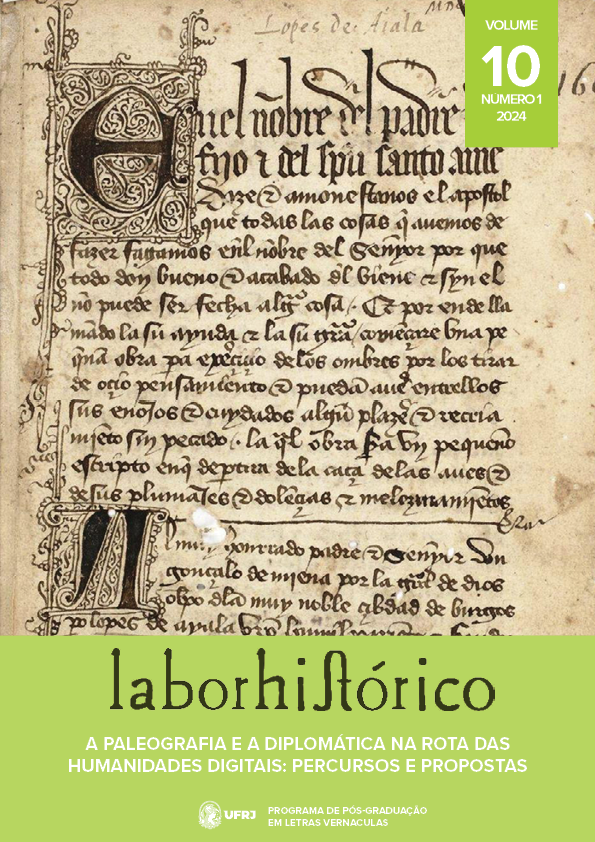Musicologia histórica e arquivos digitais em Portugal: possibilidades e desafios. Os fundos musicais do Mosteiro de Arouca e da Biblioteca-Museu da Casa de Bragança: algumas questões metodológicas sobre a construção de um arquivo digital
DOI:
https://doi.org/10.24206/lh.v10i1.63290Palabras clave:
Musicologia; arquivos digitais; fontes musicais; terminologia.Resumen
O relevo da tecnologia digital nas Humanidades não precisa de ser sublinhado, tão vastas se revelam as possibilidades trazidas pelas ferramentas digitais na conservação, no processamento e no acesso em larga escala às mais variadas fontes de informação. Também na Musicologia Histórica se tem feito sentir de modo profundo o impacto do mundo digital, particularmente visível na multiplicação de bases de dados, seja na catalogação de repertórios específicos ou fundos documentais localizados, seja mesmo com a incorporação de recursos relacionados com a codificação da notação musical. No processo de construção das plataformas para a catalogação das fontes musicais, as questões metodológicas são fulcrais, de modo a que os dados acumulados permitam distintos níveis de utilização e produção acrescida de conhecimento, potenciando a interoperacionalidade entre sistemas digitais. A diversidade das fontes consideradas (nos planos temporal, do suporte material, dos conteúdos, da destinação, da conservação, etc.) suscita dificuldades. A isto acresce, por outro lado, a multidisciplinaridade envolvida na descrição destes materiais, englobando várias áreas de especialidade: musicologia, paleografia, codicologia, liturgia, história da arte, entre outras. São ainda escassos, todavia, os estudos sobre a catalogação de fontes musicais, faltando critérios normalizados, sejam eles de cariz musicológico, bibliográfico ou arquivístico. Este artigo considera, como estudos de caso, dois arquivos digitais de fundos musicais: “Acervo histórico do Mosteiro de Arouca – Catálogo” e o “Catálogo do Arquivo Musical do Museu-Biblioteca da Casa de Bragança”, procurando apresentar algumas das coordenadas metodológicas que têm orientado a construção destas bases.
Citas
ALEGRIA, José Augusto (1989). Biblioteca do Palácio Real de Vila Viçosa. Catálogo dos Fundos Musicais. s.l.: Fundação Calouste Gulbenkian.
BOUDEAU, Océane; SAINT-CRICQ, Gaël (2020). Les ressources et publications numériques de la musique medievale. Révue de Musicologie, 106, n. 1, p. 175-190.
CRANMER, David. Museu-Biblioteca da Casa de Bragança, Vila Viçosa. Catálogo do Arquivo Musical (versão PDF). Apresentação (2019) [Em linha]. Lisboa: CESEM FSCH/NOVA. [Consult. 29 de Setembro 2021]. Disponível em https://drive.google.com/file/d/1OhDdJafzQnNBCmad6ydchG0xqlHLotu_/view.
FERREIRA, Manuel Pedro (coord. científica) (2011). Portuguese Early Music Database [Em linha]. Lisboa: CESEM FCSH/NOVA. [Consult. 28 de Setembro 2021]. Disponível em http://pemdatabase.eu/.
FERREIRA, Manuel Pedro (coord. científica) (2017a). Acervo histórico do Mosteiro de Arouca. Catálogo [Em linha]. Lisboa: CESEM FCSH/NOVA. [Consult. 28 de Setembro 2021]. Disponível em https://arouca.fcsh.unl.pt/.
FERREIRA, Manuel Pedro (coord. científica) (2017b). Catálogo do Arquivo Musical do Museu-Biblioteca da Casa de Bragança [Em linha]. Lisboa: CESEM FCSH/NOVA. [Consult. 28 de Setembro 2021]. Disponível em https://vvpducalmus.fcsh.unl.pt/.
LACOSTE, Debra (dir.). Cantus Index. Online catalogue for Mass and Office chants [Em linha]. Canadá: University of Waterloo. [Consult. 30 de Setembro 2021]. Disponível em http://cantusindex.org/.
MARQUES, António Jorge (2012). A obra religiosa de Marcos António Portugal (1762-1830). Catálogo temático, crítica de fontes e de texto, proposta de cronologia (apêndice A). Lisboa: Biblioteca Nacional de Portugal. Centro de Estudos de Sociologia e Estética Musical FCSH/NOVA.
URBERG, Michelle (2017). Pasts and Futures of Digital Humanities in Musicology: Moving Towards a “Bigger Tent”, Music Reference Services Quarterly, n. 20 p. 3-4, p. 134-150.
Descargas
Publicado
Número
Sección
Licencia
Derechos de autor 2024 Alberto Medina de Seiça, Zuelma Chaves

Esta obra está bajo una licencia internacional Creative Commons Atribución-NoComercial 4.0.
El autor del texto enviado a la Revista LaborHistorico cede los derechos autorales a la Revista, en caso de que el texto sea publicado. Sin embargo, los autores mantienen el derecho de compartir, copiar, distribuir, ejecutar y comunicar publicamente el trabajo bajo la condición de hacer referencia a la Revista LaborHistórico.
Todos los trabajos se encuentran bajo la Licencia Creative Commons Reconocimiento-NoComercial 4.0 Internacional.
Los autores son los únicos responsables del contenido de los trabajos. Está prohibido el envío integral o parcial del texto ya publicado en la Revista a otras revistas.


